
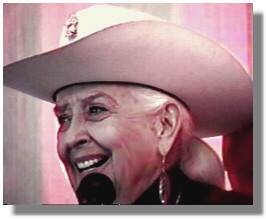
Sally Starr
at the Broadcast Pioneers Luncheon
Wednesday, March 20, 2002
The Legendary Sally Starr (Our Gal Sal) has been a prominent personality on the Philadelphia area television, radio and stage for over fifty years. She was, what can be described as a total performer, having been not only a pioneer in TV, but also the first top-rated female DJ in the country, working as announcer, writer and producer.
Born in Kansas City, Missouri on January 25, 1923, Alleen Mae Beller (Sally Starr), was the second oldest of five girls. Her parents, Charles and Bertha Beller (Sally told us that she changed her name legally to Sally Starr in 1941) encouraged her to enter the world of show business for which she exhibited both talent and ambition. She and her sister Mildred, billed as the "Little Missouri Maids," made their first debut on a CBS radio program titled "Brush Creek Follies."
Sally told us the year was 1935. However, "Brush Creek Follies" didn't start airing until 1938. At first the show was a local program on the local CBS Radio affiliate KMBC, 950 on AM in Kansas City, Missouri. Later, portions of the broadcast were aired on CBS Radio. It was sort of like Bandstand with both local and network portions. We talked with Sally's sister Mary. She told us that either the date was incorrect or that it was a similar show but not "Brush Creek Follies."
Broadcast Pioneers member Sally Starr had a flair for country music all her life. She continued singing and performing for live audiences throughout her young adult life. By the end of the 1940's, Sally had the opportunity to bring her unique talent to the broadcast medium. She served as the regional voice of the Pepsi-Cola Company, doing all their commercial spots and eventually landed in full-time radio.
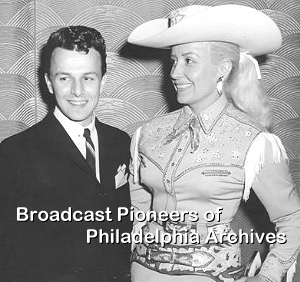
(left to right) Members Charlie Gracie and Sally Starr
WFIL-TV Studios, 46th and Market, Philadelphia
circa 1960
The 1940's saw her marriage to Jesse Rogers and together they began performing on radio programs such as "Hayloft Hoe-Down" which emanated from the old Town Hall in Center City Philadelphia. Sally also organized her own band, "The Saddle Buddies," and performed at all of the top local clubs, including "The Santa Fe Ranch" and "The Sleepy Hollow Ranch."
There seems to be some confusion in people's minds (and in the press) about when Sally started in television. Her husband, Jesse Rogers, was hired to play the character of "Ranger Joe," named after the pre-sweetened cereal. This show started in 1950. The telecast aired in different years on ABC and NBC-TV. The broadcast originated out of Philadelphia from the local network affiliate. Sally was sometimes on the program.
Jesse was also a disc jockey on WJMJ Radio (1540 on AM). Eventually, Rogers got too busy to radio and Sally took over hosting duties. Sally's own TV shows started in 1955.
On Monday, October 3, 1955, Sally Starr entered the "infant" medium of television as hostess of what would eventually become Philadelphia's highest rated children's program: "Popeye Theater." Sally's pioneering format consisted of her presenting half-hour western TV shows, cartoons, Three Stooges comedies, live acts and special features. During this same period, Sally also had a country music radio program over Philly's WJMJ. She was the recipient of many prestigious awards from Nashville.
At 6:15 pm, "Starr Theater" rode onto the airwaves with two westerns. The first one was Gene Autry and then "The Range Rider." At 7:15 pm was the ABC-TV network news with John Daly. On Monday, February 6, 1956, "Starr Theater" moved to the 6 to 7 pm time slot. The news went to 7 o'clock with a new anchor, Gunnar Back, a member of our Hall of Fame.
When "Starr Theater" first came on the air, Channel 6 managers didn't consider Sally to be that important. The TV Guide and the television listings in "The Philadelphia Inquirer" didn't even mention Sally Starr or "Starr Theater." Those two publications were owned at that time by Triangle Publications which also owned WFIL-TV. However, slowly Sally became more important than the westerns.
Until March of 1956, all the print ads just mentioned the western programs with no word of Sally and no photo of her. In March, we saw the first ads with Sally in them and her name being printed. On April 9, 1956, TV Guide changed the listings from "Gene Autry" & "The Range Rider" to "Starr Theater." Under that, it then mentioned the two westerns and what each show was about.
Sally Starr (just like Uncle WIP in the twenties) became more important and a larger draw than the show's content. "Popeye Theater" didn't hit the airwaves until Monday, July 29, 1957 at 6 pm. It replaced the first half-hour of "Starr Theater." At 6:30 pm, was "Starr Theater" which on that date featured "The Cisco Kid." Eventually "Popeye" would win out and the westerns were dropped.
Every once in awhile, we get an e-mail from someone wanting to know the name of Sally's horse. The answer is PAL! According to Sally, she purchased Pal, short for palomino, in Trenton for $1,000. He was a three year old at that time and he lived another 25 years, spending his last few years at Starr's sister's farm near Kansas City, MO. She said, "he died doin' just what he loved best. He was just bummin' around."
Before Sally got Pal, she fell in love with Topaz, her husband's horse. She also had another palomino horse called, "Silver Kane," which was sired by "Silver" of "The Lone Ranger" fame. She paid $3,500 for him and "Silver Kane" earned his keep from "stud fees." Some people thought her horse was named, "Buttercup," but Sally said that she never owned a horse by that name. By the way, for a time, Sally boarded her horses at the stables of Broadcast Pioneers member George Koehler, former manager of the WFIL stations.
Many of the top entertainers of the day visited Sally on her daily TV show, which was broadcast LIVE from Channel 6. They included Chief Halftown, Roy Rogers and Dale Evans, Chuck Connors (The Rifleman), Dick Clark, Jerry Lewis, Tim Conway, Jimmy Durante, Nick Adams, Gene Autry and of course, her long time friends, The Three Stooges. Many distinguished advertisers were eager to sponsor Sally's program. It was Sally who opened the first Dunkin' Donuts franchise in the Philadelphia area. She also introduced her viewers to Kentucky Fried Chicken and reintroduced them to Hires Root Beer to name a few. Even Colonel Sanders himself was a frequent TV guest of Sally's, and made numerous appearances particularly during the Christmas season.
For about a year, Sally Starr's program was actually carried live on both WFIL-TV, Channel 6 in Philadelphia and WLYH-TV, Channel 15, licensed to Lebanon-Lancaster. Both stations were owned by Triangle Publications. The simulcast was when WLYH first came on the air and they needed local programming to fill the schedule. Other Channel 6 programs were also telecasted over the Lebanon-Lancaster station.
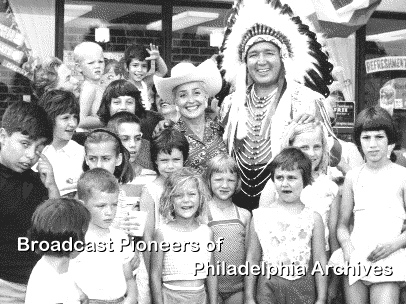
In 1965, Sally Starr turned actress when she had a feature role as Belle Starr in "The Outlaws Is Coming" with the Three Stooges. It was the last feature film to be made by the Stooges at Columbia Pictures in Hollywood.
Sally and her second husband, the love of her life, Mark Gray traveled to California to shoot the scenes. It was there that Starr met John Wayne, her idol for many years. She and Mark drove around looking for "the Duke." And they found him. Our Gal Sal said, " He was so nice. He was everything I thought he would be and more. We sat and had coffee. Not booze. He was very impressed that someone would go to all the trouble to look him up."
Mark managed Sally's career for awhile but found it too hectic and decided to sell real estate instead. He passed away in 1968. By now, by the way, many of the young viewers were referring to Starr as "Aunt Sally."
Sally has also had major roles in such movies as "The In Crowd," "Mannequin on the Move" and "Holiday Journey." Sally was also a recording artist, having performed with the legendary Bill Haley and the Comets. She sold thousands of records under the Clymax label, which was one of Haley's local companies.
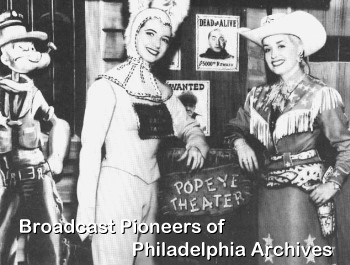
As an author, children were fond of reading Sally's stories which were published at the time her program was at the peak of its popularity in the early 1960's.
Entertainment aside, Sally was instrumental in many notable charities, helping thousands of handicapped children and other unfortunates throughout the run of her television program.
To the remorse of countless, loyal TV fans, Sally lost her program on channel 6 (WPVI-TV) in 1971. Delaware Valley viewers responded accordingly with the largest mail protest in the station's history!
In 1984, Sally Starr told Daily News Columnist Stu Bykofsky why a woman who so loved children had none of her own:: "Unfortunately, I had polio and it affected me in ways that prevented me from having children. I never met a child that I couldn't make up with or that I couldn't have a decent conversation with, couldn't laugh with, couldn't have fun with. Will
Rogers said he never met a man he didn't like. I never met a child I didn't like. I met some who were ornerier than others. It's just a solid fact that I love children. I love people and I guess it comes out. It stems from my early days, I guess, of coming from a large family."
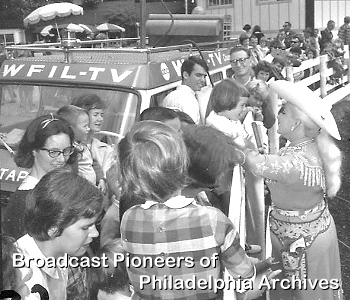
Member Sally Starr with fans
The Devon Horse Show
May 1965
(Previously unreleased photo)
Since leaving channel 6, Sally Starr has produced and hosted local TV shows on Channel 29 and 65. When a fire destroyed her home in Florida in the Spring of 1987, many of her loyal baby-boomer fans came to her financial rescue. They were happy to assist Sally who lost most of her worldly possessions including her unfinished autobiography. This affection is typical of the love Sally has inspired among her fans of many ages.
She completed a book which has already sold thousands of copies entitled: "Me, Thee & TV" an autobiographical journey through her personal and professional life. Sally also recently appeared in the stage hit: "Annie Get Your Gun" at the Three Little Bakers Theatre. She played an "older" Annie with creative flashbacks. A role that was written especially for Sally in this popular stage production.
Sally was the host of a three hour radio show on, Cruisin' 92.1, WVLT in Vineland, New Jersey for many years. The show aired every Sunday from Noon to 3:00 pm. Sally retired on Sunday, September 3, 2006.
Sally was instrumental in the resurrection of the "Wilson Line Show Cruises." She was a survivor, having had a heart attack in 1993. She lived in her home in Atco, New Jersey. Sally Starr had received many honors including being inducted into our Hall of Fame in 1995. She passed away on Sunday, January 27, 2013 at 6:30 am.
As we said earlier, Sally Starr premiered on Channel 6 on Monday, October 3, 1955 on "Starr Theater" from 6:15 pm to 7:15 pm. It was then that she hosted half-hour western TV shows. For the first several months of the show, the two westerns were "The Gene Autry Show" and "The Range Rider." Later, the lineup would include "The Cisco Kid" and "Kit Carson." Sally's first program premiered 75 minutes after the debut of the now legendary "Mickey Mouse Club," which was on from 5 to 6 pm. At 6 pm, the Television Newsreel newscast with Frank Hall came on the air for ten minutes followed by five minutes of weather done by Dr. Francis Davis, a member of the Broadcast Pioneers.
At 6:15 pm, "Starr Theater" hit the airwaves with two westerns. The first one was Gene Autry and then "The Range Rider." At 7:15 pm was the ABC-TV network news with John Daly. On Monday, February 6, 1956, "Starr Theater" moved to the 6 to 7 pm time slot. The news went to 7 o'clock with a new anchor, Gunnar Back, a member of our Hall of Fame.
When "Starr Theater" first came on the air, Channel 6 managers didn't consider Sally to be that important. The TV Guide and the television listings in "The Philadelphia Inquirer" didn't even mention Sally Starr or "Starr Theater." Those two publications were owned at that time by Triangle Publications which also owned WFIL-TV. However, slowly Sally became more important than the westerns.
Until March of 1956, all the print ads just mentioned the western programs with no word of Sally and no photo of her. In March, we saw the first ads with Sally in them and her name being printed. On April 9, 1956, TV Guide changed the listings from "Gene Autry" & "The Range Rider" to "Starr Theater." Under that, it then mentioned the two westerns and what each show was about.
Sally Starr (just like Uncle WIP in the twenties) became more important and a larger draw than the show's content. "Popeye Theater" didn't hit the airwaves until Monday, July 29, 1957 at 6 pm. It replaced the first half-hour of "Starr Theater." At 6:30 pm, was "Starr Theater" which on that date featured "The Cisco Kid." Eventually "Popeye" would win out and the westerns dropped.
Every once in awhile, we get an e-mail from someone wanting to know the name of Sally's horse. The answer is PAL! According to Sally, who is a member of the Broadcast Pioneers of Philadelphia, she purchased Pal, short for palomino, in Trenton for $1,000. He was a three year old at that time and he lived another 25 years, spending his last few years at Starr's sister's farm near Kansas City, MO. She said, "he died doin' just what he loved best. He was just bummin' around."
Before Sally got Pal, she fell in love with Topaz, her husband's (Jesse Rogers, aka Ranger Joe) horse. She also had another palomino horse called, "Silver Kane," which was sired by "Silver" of "The Lone Ranger" fame. She paid $3,500 for him and "Silver Kane" earned his keep from "stud fees." Some people thought her horse was named, "Buttercup," but Sally said that she never owned a horse by that name. By the way, for a time, Sally boarded her horses at the stables of Broadcast Pioneers member George Koehler, former manager of the WFIL stations.
The Delaware Valley will miss Sally. Actually, she is already missed but she will always be loved. The local girl from Kansas City who grew up singing "hillbilly" music came to Philly and became a TV star. Well, that's incorrect. She became a TV Legend.
"Thank you for being so nice to me and may the Good Lord be blessing you and your family. Remember, I do love you lots. Love, luck and lollipops. (Kiss) Bye for now."
A visitor to our website, George Baylie, formerly of WIBG News and WIFI-FM News wrote:
When I was twelve years old I convinced my Mother to take me to 69th Street to see Sally Starr who was appearing for a Christmas promotion. She told us on the TV that If we were too young to go ourselves, to ask Mom if she could take us on a Saturday at Noon. As a kid, I was never even at 69th Street.
We went by public transportation and there were actually thousands of people at 69th and Market Streets. We walked to the top of the hill and wormed our way to be right at the Police barricades. We could hear the crowds roar all the way up there as Sally Starr on a horse went up the hill. She crossed and back tracked each side of the street, taking her time so all the people could see her.
About six Upper Darby Police Officers walked along the route with her. It took her at least a half hour to get up to the top of the hill where we were. She was great! By then the police had given her a small megaphone so she could call out to all of us. I was very satisfied that I saw Sally up front and personal that day. Plus, going to a place I had never been to. The following Monday on her show she said (to me) "Did you see me on Saturday at 69th Street?"....and I said YES! It was like she was speaking just to me.
Years later I met Sally with DJ Ron Joseph at a night club down on Delaware Avenue....we were seated outside. She looked wonderful and was just as sweet as could be. Sally Starr.....you were a true STAR to the hundreds and thousands of people you spoke with five days a week. There are no more people like Sally, and there never will be in our lifetime.
Broadcast Pioneers member Leigh Richards said on our Facebook page:
Sally Starr was a star to all of the kids in Philadelphia. We were little cowgirls and cowboys with boots and cowboy hats. For many of us, riding horses was a passion, with many stables in the city. We all loved the beautiful blonde with her white hat and horse, and kind words to everyone. Thanks to Sally Starr for being a great role model.
From the official archives of the Broadcast Pioneers of Philadelphia
Written, researched and compiled by Broadcast Pioneers historian Gerry Wilkinson
© 2009 & 2013, Broadcast Pioneers of Philadelphia
All Rights Reserved
The e-mail address of the Broadcast Pioneers of Philadelphia is pioneers@broadcastpioneers.com